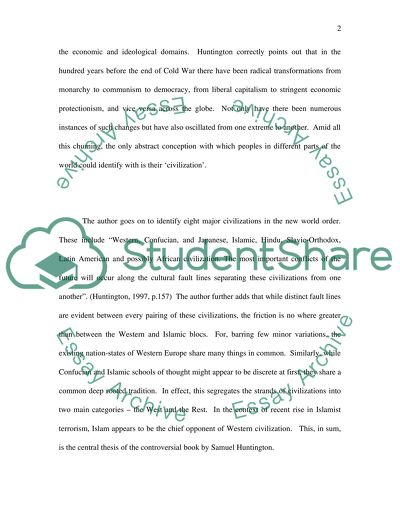Cite this document
(“Modern Middle East Paper on Samuel P. Huntingtons The Clash of Essay”, n.d.)
Retrieved from https://studentshare.org/miscellaneous/1554683-modern-middle-east-paper-on-samuel-p-huntingtons-the-clash-of-civilizations-of-the-coming-of-the-new-world-order-and-edward-w-saids-article-the-clash-of-ignorance-in-the-nation-magazine
Retrieved from https://studentshare.org/miscellaneous/1554683-modern-middle-east-paper-on-samuel-p-huntingtons-the-clash-of-civilizations-of-the-coming-of-the-new-world-order-and-edward-w-saids-article-the-clash-of-ignorance-in-the-nation-magazine
(Modern Middle East Paper on Samuel P. Huntingtons The Clash of Essay)
https://studentshare.org/miscellaneous/1554683-modern-middle-east-paper-on-samuel-p-huntingtons-the-clash-of-civilizations-of-the-coming-of-the-new-world-order-and-edward-w-saids-article-the-clash-of-ignorance-in-the-nation-magazine.
https://studentshare.org/miscellaneous/1554683-modern-middle-east-paper-on-samuel-p-huntingtons-the-clash-of-civilizations-of-the-coming-of-the-new-world-order-and-edward-w-saids-article-the-clash-of-ignorance-in-the-nation-magazine.
“Modern Middle East Paper on Samuel P. Huntingtons The Clash of Essay”, n.d. https://studentshare.org/miscellaneous/1554683-modern-middle-east-paper-on-samuel-p-huntingtons-the-clash-of-civilizations-of-the-coming-of-the-new-world-order-and-edward-w-saids-article-the-clash-of-ignorance-in-the-nation-magazine.


